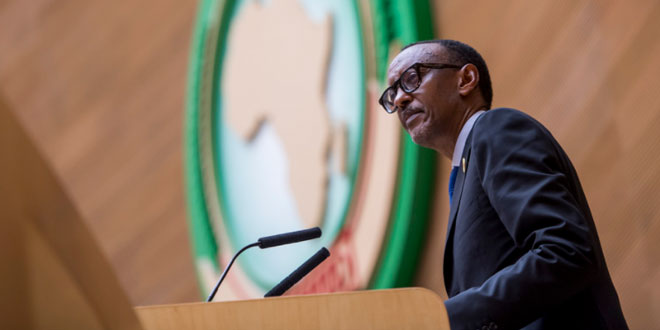
How attempts to tarnish the name and record of Paul Kagame soils the reputation of a British journalist
THE LAST WORD | ANDREW M. MWENDA | Finally, I have finished reading Michela Wrong’s 516 memoir of Patrick Karegyeya; a former Rwandan intelligence chief who was killed on or about New Year’s Eve or New Year’s Day 2013/2014 in a hotel suite in Johannesburg, South Africa. Wrong is a compelling writer.
‘Do Not Disturb’ (that is the title of the book) is a captivating read, riveting with scintillating details. One can easily think it is well researched – that is if they are ignorant of the realities of post genocide Rwanda. It is a one-sided account that lacks context. Rarely in the history of our profession has a journalist thrown away all pretense to fairness and balance
Wrong opens the book with a classic prejudice that all Rwandans are liars. In fact, she argues quoting contemporary Rwanda politicians she interviewed, lying for Rwandans in “an art form,” a “part of their culture.” Then she quotes a 19th Century European traveler saying that “Of all the liars in African, I believe the people of Ruanda are the most thorough.” And she agrees. Just imagine in a continent of thousands of cultures, how could this European have studied all of them to arrive at such a conclusion. If you are a Rwandan, it would require incredible tenacity to proceed.
But this is where the contradiction in Wrong’s convictions comes out. If she accepts that lying is an art form in Rwanda, she does so only when someone speaks in defense of President Paul Kagame and/or his government. But when it comes to claims, allegations, accusations and assertions by Kagame’s enemies against the president, the Rwandans she interviewed cease to be liars – their every allegation is treated as gospel truth. Wrong made no effort to do basic journalistic work i.e. listen to Kagame’s side (fairness). In her court (where she acts as the investigator, prosecutor, judge and jury) Kagame is not entitled to a defense at all.
There is one great lesson I got from Wrong’s book, and that is my own culpability in her distorted Rwanda narrative: we African journalists do not write books about our countries. We leave it to Western academics and journalists seeking to purvey their prejudices about us, our leaders and our governments. In fact, when we have written books, we too have not provided the needed context. Instead we have regurgitated their prejudices. I am one of the best-informed journalists on Rwanda, having been close to most of the important players in that country. And I haven’t published a book on post genocide Rwanda yet. I admit I have failed Rwanda – and Africa.
Interestingly I got to know Wrong through Karegyeya. Once having coffee in Kigali in 2002, Karegyeya told me: Andrew, you should read a book titled `In the Footsteps of Mr. Kurtz’ by a journalist called Michela Wrong.”
Back in Kampala, I bought a copy and devoured it. Something struck me: everyone had been led to believe former Congolese president, Mobutu Sese Seko, “looted” $8 billions of his country’s money. Wrong went looking for that fortune and found only two or three properties in Europe and $20 million on a Swiss bank account. She concluded that for Mobutu, money was not an end but a means to an end, the end being power. Mobutu had taken a lot of money from the Congolese treasury, Wrong agreed. But it was not to accumulate a private fortune. It was to pay for his political survival. She transformed me.
While in London in 2005, Charles Onyango-Obbo introduced me to Wrong at a dinner at Lancester House. “Andrew”, Charles called me, “do you know Michela Wrong?” I walked to her with a beaming smile and without greeting her, held her in both arms around the waist and lifted her off the ground in hero worship. “I read your book on Congo and it transformed my thinking about Mobutu specifically and corruption among politicians in Africa generally,” I said as I put her back on her feet and she adjusted herself to the shock of a stranger carrying her midair. “I wish all my readers could be like you,” she said. We became “friends” in the lose way we Africans use that word. Acquaintances would be better used.
But when she came to write about Kagame and Karegyeya, Wrong lost herself – that cool, detached assessment of issues. She transformed into a partisan hack, doing a hatchet job on Kagame and his government. She got convinced that Karegyeya was killed on Kagame’s orders and proceeded to conduct an “investigation” to prove her hypothesis. Even when her findings cast suspicion on the South African government, she is blind to it. Her mind was closed and hence she made no effort to explore any other hypothesis.
For instance, why did the South African government drag its feet and ultimately fail to prosecute the case six years later? Wrong claims it was intimidated by the Rwandan government. Really? President Jacob Zuma was not a friend of Kagame. He and former South African Intelligence Chief, Bill Masetera, were very close to Karegyeya. Couldn’t they have pushed for prosecution?
When Karegyeya was murdered, I said on television that the government of Rwanda was the number one suspect, but not the only one. He had stepped on many people’s toes as head of intelligence in Rwanda, and they could have sought revenge. A Burundian musician had been killed in a hotel in Johannesburg and his family blamed Karegyeya for it. They claimed he had been sleeping with his girlfriend. Didn’t they have motive? And I knew Karegyeya had been involved in arms dealings for RNC, his party. Did he double cross anyone in this risky business? All these leads are important.
Then later, I got a tip that Rwandan intelligence had skillfully leaked information to South African intelligence that Karegyeya was, through Paul Gafaranga, reconciling with Kagame and was poised to return to Kigali. The South African and Tanzanian armies were in Eastern DRC to “fight subversive forces.” But instead they had only beaten M23, a rebel group allied to Kigali.
Instead, using Karegyeya’s contacts among Hutu extremists, the Tanzanians and South Africans were trading in minerals. Zuma’s nephew was a big player. And quite importantly, President Jakaya Kikwete and Zuma were both close friends to Karegyeya.
Could the South Africans have feared that if Karegyeya returned to Rwanda he would expose their mineral secrets and their work with Hutu extremists whom they were meant to fight?
This hypothesis may not be true but it is worth exploring. I shared it with Wrong in London and I feel it deserved a follow-up or at least a mention in the book. I also shared it with Samantha Power, Obama’s UN ambassador, and British intelligence. Wrong was not interested. She just wanted to present Kagame, a leader loved by the vast majority of his citizens and admired across Africa and the world as a violent psychopath.
But let us accept, just for argument’s sake, that the Rwandan state actually killed Karegyeya. Would this be because Kagame is a violent psychopath? Karegyeya himself gave the answer.
“You have to understand,” Wrong quotes Karegyeya speaking to someone in Kenya’s capital, Nairobi, “we are a small and densely populated country. We have a higher population density than any other country in Africa. So we have no space for another war. We just don’t have the strategic geographical depth. Because of that, every threat will be dealt with preemptively and extra territorially, because we do not have room for it to take place on our sovereign territory. So what you call murder is not a crime but an act of war by other means and if it took place in any other circumstances, we would be congratulated and praised for it. We have chosen to externalise the battlefield and preempt the threat. Externalising the war zone is part of that policy and so is buffering.”
There is nothing novel in what Karegyeya was saying. Many countries have always acted extra-territorially depending on their judgement of the nature of the threats they faced.
 The Independent Uganda: You get the Truth we Pay the Price
The Independent Uganda: You get the Truth we Pay the Price




This is a good introduction.
You have raised all the questions to which we seek answers.
In a court of law, this would be called reasonable doubt.
But if you are going to fully acquit your client, you are going to have to be the fictional Perry Mason and not the modern miracle workers our lawyers today purport themselves to be. I am a rational reader (a rarity on this website) but I am also a voraciously hungry seeker of knowledge.
I look forward to the rest of this….. this.
JUST DO NOT BELIEVE KAGAME KAGAME STORIES RWANDA STORIES STORIES DIRECTLY OR INDIRECTLY LINKED TO RWANDA …….. THESE TRAGEDIES AND KILLINGS OF YESTERDAY TODAY AND TOMORROW
ARE WERE AND STILL ARE ABOUT THE SCATTERINGS AND PLUNDERINGS OF AFRICA NATIONS
I have not seen this specific book but another book by the same Wrong is very compelling. I think it is called
Ordinary Miracles The book delves into the failing of the African dream in a number of sampled African countries. Now that she has delved into the murky history of genocide Rwanda, the first thing M9 does is to rush and neutralize this bad press. I think at this time in M9 journalist career, stories related to murder intrigue and politics, very few of his readers believe a word of what he says.Am certain that every single death of Rwandans for what ever reason makes humanity cringe.the ‘ the genocide taught them nothing’ and today they move allover the world blaming everyone except themselves for this tragedy. If what ms Wrong writes is a pack of Falsehood’s, then nobody need read their book but am certain this piece has increase the sales of that book. If you read and of her books then you are oready hooked . I hope nobody bans the book
Thank you
Andrew Mwenda really has no integrity at all. It is funny how you can be so critical of Museveni, and be right about it sometimes, yet you do mental gymnastics to suck up to PK.
As a Rwandan we all know what Michela Wrong writes about is true. Stop trying to do damage control for your masters. You can fool some of the people for sometime but you can’t fool everyone all the time.
There is a lot of truth in what Wrong is saying,infact she is like Mwenda, sometimes even Him shows his inner feelings in his articles…So he can punch holes in Wrong’s piece but not enough to discredt it.
I am reading the last chapter and boy, is the book good! I recommend it to everyone who wants to know how the Great Lakes region got into the mess it was thrown into from 1990 to date!
I got this from that book ‘ Fool me once, shame on you; fool me twice, shame on me
Andrew Andrew Andrew! You remind me of my self. I got a Ph.D. six years ago and consider myself brilliant and an intellectual yet to my disappointment, I have published only two peer review papers and alas I am realizing that maybe I am not as brilliant as I thought I was, because even some of my own students have published more copiously. …and here is where I part ways with you…recognizing that my limitations.
But you Andrew, are very quick to criticize a brilliant piece of work ( which I read and is based on truth) simply because you are kowtowing to Kagame. Write your own version of the story and that would be the best indictment of Michaela Wrong. But of course you will not. Because as I have discovered as an aspiring writer, it is easier to criticize other peoples work to make yourself look brilliant than create your own!
At this rate of lying about liars (in form), AM must be a Munyarwanda.